Who doesn’t love a classic bagel for breakfast or a cherry pie after dinner? Baked goods are great for a quick meal on the way to the office, a filling snack for a quiet Sunday afternoon with a cup of tea. They are what makes the world go round.
Baking is both an art and a science. Its intricacies and specific requirements prompt an artist’s gentle hands and a critical thinker’s mind for accuracy. Romanticizing aside, baking could be your passion, but you have to confront the practical issues of having a bakery as a startup.
It pays to look into the practical details, so you can keep doing what you love. Review possible mishaps and costs that might come along the way so that you can factor them in on your future decisions.
Sanitation Upkeep
Sanitation is more than washing dishes and cleaning meat-processing tools regularly. It’s about maintaining the recommended level of cleanliness and keeping it on par with your state’s standards.
When it comes to cleaning the kitchen, especially when you’re making food for many people, cleaning as you go may not cut it. A lack of sanitation practices can cause food-borne illness, and that’s the last thing anybody wants.
When choosing equipment in the kitchen, the main objective is to prevent the contamination of baked goods, raw materials, and other ingredients. Equipment and surfaces should be easy to clean, decontaminate, prevent the growth of microorganisms, insulation, and more. That’s why stainless steel tables, counters, work tables, and more are commonly used in food service establishments.
Hygiene plays a part in keeping the integrity of the food, ultimately affecting customers’ opinions of your bakery. Something as little as contamination of ingredients or accidental spillage can affect it.
Consider investing in equipment that’s baking-friendly and good for hands-on kneading and manipulation of ingredients. Remind your staff to also practice personal hygiene. After all, good sanitation starts with the individual.
The Risk of Inefficiency
Baking is surely time-consuming. It always has been and will continue to be especially when there are multiple factors to consider (it is a science, after all). But even then, that can be compensated by a skilled group of kitchen staff who are timely and detail-oriented in their baking. In some cases, however, the kitchen staff themselves are the problem. That can be bad for the business.
To have an effective staff, handpick your bakers and personnel. Train them on how to prepare and present the goods while providing samples. Help both front and back house staff get an intimate knowledge of the baked goods.
Packaging

Packaging is more important than you think. Other than storing the goods you work hard to bake, they can be part of branding too. Branding is effective when it helps customers to distinguish your business from competitors. Another thing to help boost brand awareness is by going to social media channels to market your products. Hosting giveaways is one way of spreading the word about your yummy pastries.
What a bakery typically needs are twist ties, ribbons, paper bags, paper wraps, foil, to name a few. But when it comes to it, you can get as creative as you are with your recipes. This might even make you stand out from the rest. However, you must consider the financial situation before you get too excited.
Inevitable Wastage
Sometimes, no matter how careful you might be, there’ll always be some mix-ups or poorly made bakes. You’re not in the business to serve half-baked products (no pun intended). It’s always good to put your best foot forward with customers by giving the original and pure taste of your baking. It’s all part of quality control. Although it’s not obvious, making goods from scratch the second time around can make a dent in your expenses. It’s a waste of effort, time, and ingredients.
It helps to practice expertise and attention to detail. Nobody in the kitchen should get too comfortable and slack off unless driving away customers is the goal.
But even if your baked goods are made perfectly, they’re still perishable. They can’t stay on the shelf for long. If goods are past their expiration, they may start to grow mold or smell funny. For the safety of everyone, it’s best to keep them off the shelves when they do. You also wouldn’t want to risk your customers discovering the mold themselves.
A great strategy to diminish waste significantly is by putting these goods for sale. That way, customers will enjoy your products and the price. If you make this a regular thing, you might even start having regular customers.
Pursuing a passion is fuel to keep going, but it’s not enough to achieve business growth. Having concrete action plans and clear objectives will help with the practical issues your startup will face.

